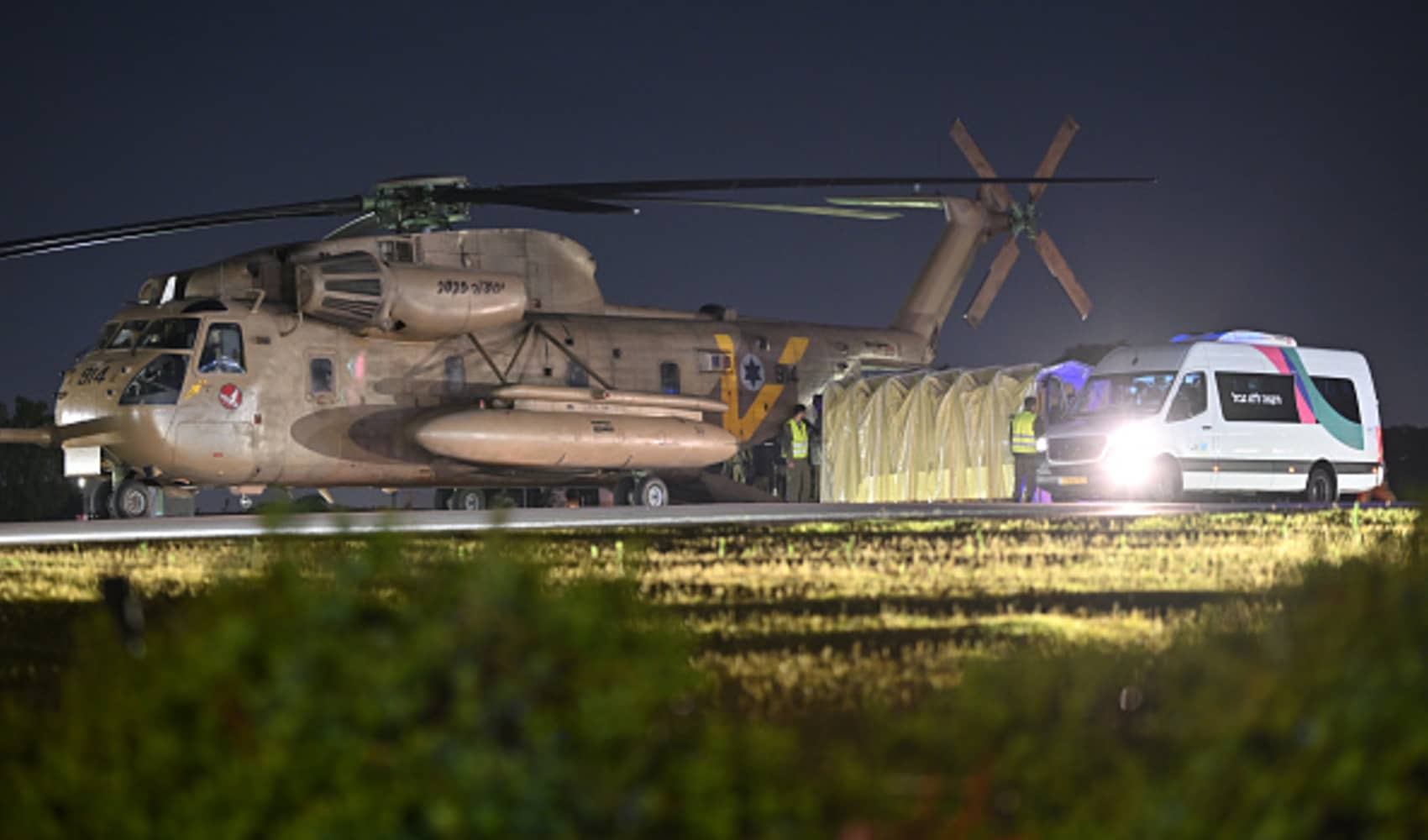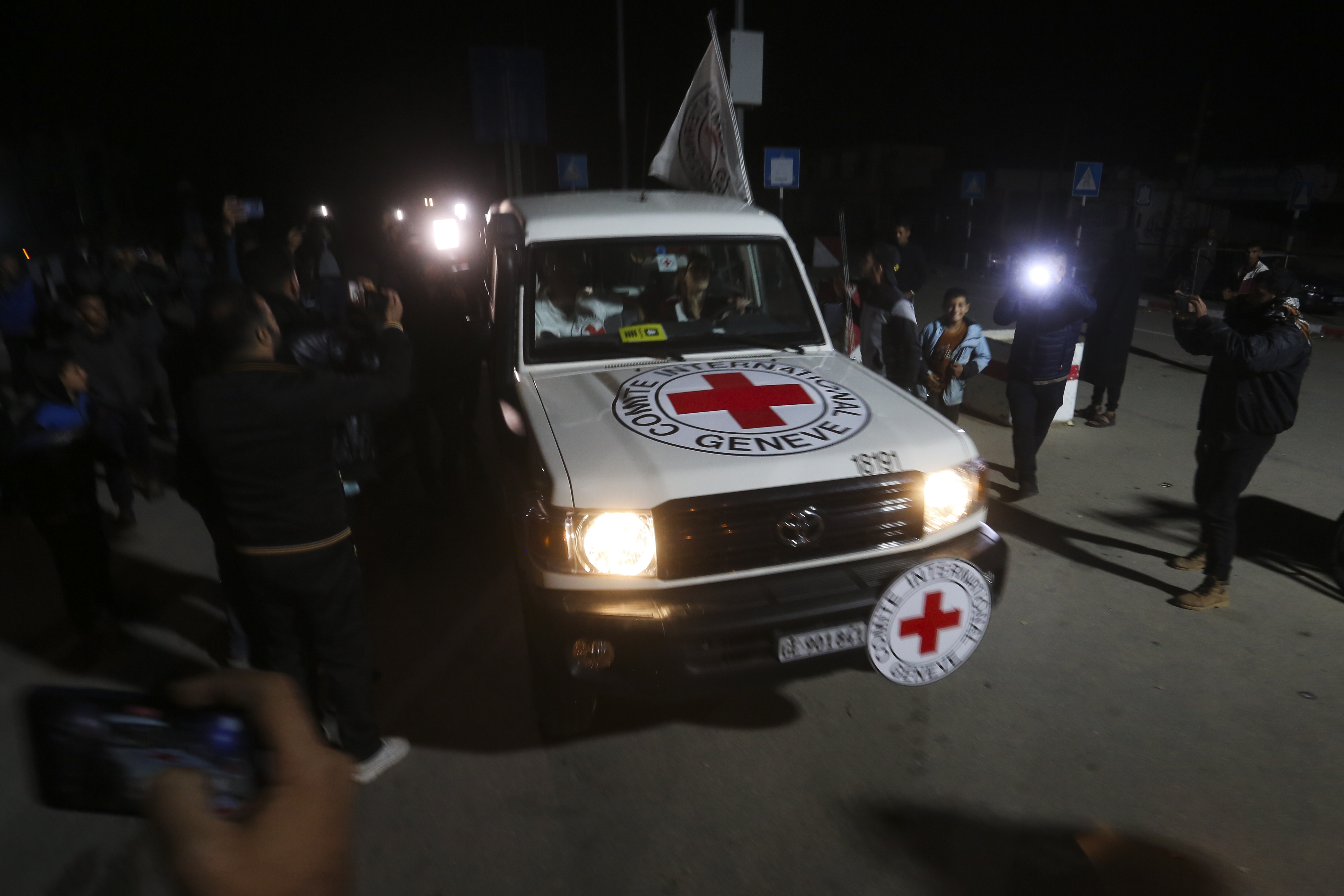Israel released another group of Palestinian prisoners Friday, hours after Hamas freed additional Israeli hostages under a last-minute agreement to extend their cease-fire by another day in Gaza. But any further extension renewal, now in its eighth day, could prove more challenging as Hamas is expected to set a higher price for many of the remaining hostages.
Hamas freed six hostages hours after releasing two Israeli women Thursday afternoon. All were handed over to the Red Cross in Gaza after eight weeks in captivity. They were brought to Israel for medical evaluations and to be reunited with their families, the Israeli military said.
A busload of 30 Palestinian prisoners released by Israel was welcomed home in the West Bank city of Ramallah, where dozens of men, some holding green Hamas flags, greeted the prisoners.
During the truce, at least 10 Israelis a day, along with other nationals, have been freed by Hamas in return for Israel’s release of at least 30 Palestinian prisoners. Asked why Hamas on Thursday released fewer than 10 hostages, as outlined in the cease-fire agreement, the military’s chief spokesman, Rear Adm. Daniel Hagari, noted that 12 Israeli citizens had been released the day before, implying that the overall total had met Israeli demands.
Get top local stories in San Diego delivered to you every morning. >Sign up for NBC San Diego's News Headlines newsletter.
“We insist on getting the maximum possible," Hagari said. "It’s been that way every day and also today.”
International pressure has mounted for the truce to continue as long as possible after weeks of Israeli bombardment and a ground campaign following Hamas’ deadly Oct. 7 attack on Israel that triggered the war. Thousands of Palestinians in Gaza have been killed and more than three-quarters of the population of 2.3 million have been uprooted, leading to a humanitarian crisis.
Israel has vowed to resume the fighting — with the goal of dismantling Hamas — once the cease-fire ends.
The cease-fire was set to expire Friday, though international mediators are working to extend it. The talks appear to be growing tougher, with Hamas having already freed most of the women and children it kidnapped on Oct. 7. The militants are expected to make greater demands in return for freeing scores of civilian men and soldiers. Roughly 140 hostages are believed to remain in Hamas captivity.
U.S. Secretary of State Antony Blinken, who met with Israeli Prime Minister Benjamin Netanyahu and other top officials on his third visit to the region since the start of the war, said he hoped the cease-fire could be extended and more hostages could be released.
Blinken also said that if Israel resumes the war and moves against southern Gaza to pursue Hamas, it must do so in “compliance with international humanitarian law" and must have “a clear plan in place” to protect civilians. He said Israeli leaders understood that ”the massive levels of civilian life and displacement scale we saw in the north not be repeated in the south.”
Most of Gaza's population is now crammed into the south with no exit, raising questions over how an Israeli offensive there can avoid heavy civilian casualties.
Qatar and Egypt, which have played a key role in mediating, are seeking to prolong the deal by another two days, according to Diaa Rashwan, the head of Egypt’s State Information Service.
Thursday morning, Palestinian gunmen opened fire on people waiting for buses along a main highway entering Jerusalem, killing at least three people and wounding several others, according to Israeli police.
The two attackers, brothers from a neighborhood in annexed east Jerusalem, were killed. After the attack, six other members of the family were detained, and the government ordered their house demolished. Hamas claimed responsibility for the attack, casting it as retaliation for the killing of women and children in Gaza and the occupied West Bank and other Israeli “crimes.”
The attack did not appear to threaten the truce in Gaza. But escalating violence — including Israeli raids — in the West Bank and east Jerusalem could blow back to wreck the quiet in Gaza, even though these areas are not covered under the cease-fire. On Wednesday, Israeli troops killed two Palestinian boys during a raid in Jenin, according to Palestinian health officials. The Israeli military separately said the raid killed two Islamic Jihad militants.
TENSE HOSTAGE TALKS
Netanyahu is under intense pressure from families of the hostages to bring them home. But his far-right governing partners are also pushing him to continue the war until Hamas is destroyed, and could abandon his coalition if he is seen as making too many concessions.
Israel says it will maintain the truce until Hamas stops releasing captives, at which point it will resume military operations aimed at eliminating the group, even as the Biden administration has urged it to operate with far greater precision if it does so.
The initial truce, which began Friday and has now been extended twice, called for the release of women and children. Israeli officials said before Thursday's hostage releases that Gaza militants still hold around 30 women and children, who would all be released within a few days at the current rate.
The two women released earlier on Thursday — who are 21 and 40 years old — have returned to Israel. Hamas said it handed them over to the Red Cross in Gaza City, suggesting they may have been held in northern Gaza, where Israeli troops have controlled much of the area for weeks and have been searching for hostages.
It’s not clear how many of the remaining women hostages might be soldiers. For soldiers and the civilian men still in captivity, Hamas is expected to demand the release of high-profile Palestinians convicted of deadly attacks, something Israel has strongly resisted in the past.
Israel says around 125 men are still held hostage, including several dozen soldiers.
The 30 Palestinians due to be released by Israel on Thursday include 22 teenagers and eight Israeli Palestinian women who were arrested since the war started, most of them for pro-Palestinian social media posts, according to the Palestinian Prisoners Club, which advocates for prisoners. Israeli authorities have carried out a crackdown on such posts, arresting more than 270 Palestinian citizens on allegations of inciting violence, according to rights groups.
The 210 Palestinians released so far under the cease-fire have mostly been teenagers accused of throwing stones and firebombs during confrontations with Israeli forces. Several of the freed women were convicted by military courts of attempting to attack soldiers, some of them after being found carrying scissors or knives near security positions.
Before Thursday’s releases, a total of 75 Israelis, including dual nationals, had been freed during the truce, most of whom appear physically well but shaken. Another 24 hostages — 23 Thais and one Filipino — have also been released, including several men.
Before the cease-fire, Hamas released four hostages, and the Israeli army rescued one. Two others were found dead in Gaza. On Thursday, the military confirmed the death of Ofir Tzarfati, who was believed to be among the hostages, without providing any further details. The 27-year-old attended a music festival where at least 360 people were killed and several others were kidnapped on Oct. 7.
Hamas and other Palestinian militants killed over 1,200 people — mostly civilians — in their wide-ranging attack across southern Israel that day and took around 240 people captive. Authorities have only ever provided approximate figures.
Israel’s bombardment and ground invasion in Gaza have killed more than 13,300 Palestinians, roughly two-thirds of them women and minors, according to the Health Ministry in Hamas-ruled Gaza, which does not differentiate between civilians and combatants.
The toll is likely much higher, as officials have only sporadically updated the count since Nov. 11. The ministry says thousands more people are feared dead under the rubble.
Israel says 77 of its soldiers have been killed in the ground offensive. It claims to have killed thousands of militants, without providing evidence.
Palestinians in Gaza have been calling for a permanent end to the war, saying the temporary truces don’t resolve the humanitarian catastrophe across the territory. Over 1.8 million people, around 80% of the territory’s population, have fled their homes, with more than 1 million sheltering in U.N. schools



